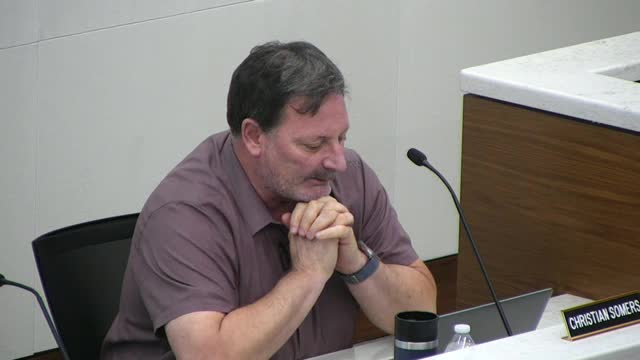Bellaire staff warns state law letting third parties approve home generators could complicate local floodplain enforcement
Get AI-powered insights, summaries, and transcripts
Subscribe
Summary
Christian, the city’s development services staff member and designee for the floodplain manager, told the Building Standards Commission on Monday that a new Texas law allowing third‑party firms to review and inspect home backup power systems will limit local control over certain permitting steps and could create compliance gaps for floodplain and lot‑coverage rules.
Christian, the city’s development services staff member and designee for the floodplain manager, told the Building Standards Commission on Monday that a new Texas law allowing third‑party firms to review and inspect home backup power systems will limit local control over certain permitting steps and could create compliance gaps for floodplain and lot‑coverage rules.
"This bill ... authorizes third party professionals to independently review and inspect property development documents and related improvements for home backup power installations," Christian said as he described Senate Bill 1202 and its author’s text, and added that the law covers "electric generating facilities, energy storage units, standby systems, and associated infrastructure designed to provide emergency power to 1 or 2 family residential dwellings" and systems operating at "600 volts or less." He said early, stricter provisions that would have required tight state timelines and fee prohibitions were removed before final passage.
The issue matters locally because Bellaire enforces higher floodplain standards than federal minimums and requires equipment and new construction to meet a design flood of the 500‑year event plus 1 foot. Christian said third‑party reviewers frequently do not address floodplain rules — including whether new installations push a property over the city’s 50 percent substantial‑improvement threshold — and staff still must verify lot coverage, equipment heights and ingress/egress for first responders.
"Essentially nothing changes with SB 1202 for staff as the third party purveyors either cannot, will not or just do not review for the floodplain codes and zoning ordinances, as well as the need to maintain sufficient ingress for first responders and egress for the occupants," Christian said. He added that, under the law, third parties have "the right to release utilities" while city staff do not, creating a potential timing problem where equipment could be installed or energized before the city has confirmed floodplain or lot‑coverage compliance.
Commissioner Wesley pressed staff on the legal basis for the city’s substantial‑improvement rules and whether the city is simply restating FEMA guidance. "So where the substantial improvement rules are those FEMA rules are those rules that we've adopted?" Wesley asked. Christian responded that those rules derive from FEMA (Title 44) and are incorporated in local ordinance and the International Residential Code (R322), and that Bellaire applies a higher design flood (500‑year plus 1 foot) than the federal base‑flood elevation.
Christian described recent, repeated plan‑review interactions with third‑party reviewers and contractors in which required elevation certificates or topo surveys were missing or the proposed equipment sat below the city’s required height. He said some projects can require substantial staff time to resolve — estimating the department handled about 150 photovoltaic or standby‑system permits last year and could be on track for roughly 250 this year — and that about 20 percent of the department’s workload currently relates to standby systems.
Staff told the commission it will take several steps: publish clear online guidance and a permitting procedure for third‑party submittals, require a pre‑development contact between third parties and city staff to confirm lot‑coverage and floodplain criteria, and consult the city attorney about how to verify and enforce local rules without violating SB 1202. "I learned today that the third parties have the right to release utilities, via SB 1202, we do not," Christian said. "So I have to figure out a way ... and I need our city's attorney's assistance with that, to make sure I'm not running a foul of SB 1202 and I'm not putting the city in jeopardy of a lawsuit."
The commission did not take formal action on SB 1202 itself. The meeting did include routine procedural votes: the body unanimously approved the minutes from the previous meeting, and later voted unanimously to cancel its November and December meetings (exact vote counts were not specified). Christian told commissioners he will prepare materials for the city website to explain what third‑party reviewers must provide and encouraged contractors to contact staff early.
The exchange highlighted two competing goals: the law’s intent to speed installations and cut bureaucratic delays, and Bellaire’s stated obligation to protect public safety, flood‑plain insurance requirements and emergency access. Christian said the city will try to streamline administrative work where possible — for example, permitting pre‑development meetings and faster staff responses — but that verification of floodplain compliance and lot coverage will remain a city responsibility.
Commissioners did not direct a specific ordinance change at this meeting; staff said it will draft procedural guidance and return to the commission if changes to city ordinances or the Building and Standards Commission’s practice are needed.
